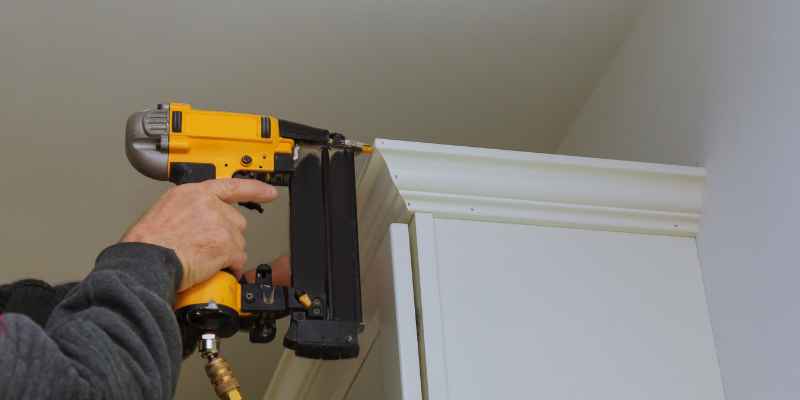Yes, 18 gauge nails can be used for baseboards. When it comes to nailing baseboards, it’s important to choose the right type and size of nail to ensure the best results.
Baseboards are often installed with either brad nails or finish nails, both of which come in various gauges. Finishing nails are the preferable option for holding thicker materials like baseboards and they’re usually available in 15- or 16-gauge sizes. However, 18-gauge nails can also be used for baseboards, especially if the wall is not made of concrete.
These nails are thinner but can still provide sufficient holding strength for the task. Using 18-gauge nails is a good option if you’re looking for a more affordable option or if you don’t have the right size finished nail and have to make do with what you have on hand.
Understanding Gauge And Nail Size
To ensure the best result when installing baseboards, it’s important to understand which nail size works the best. While 18 gauge nails may be suitable for some baseboards, it’s recommended to use 15- or 16-gauge nails for a stronger hold and better performance.
When it comes to baseboard installation, selecting the right size of nails is crucial to ensure a secure and long-lasting installation. One of the most common questions asked by DIY enthusiasts is whether they can use 18 gauge nails for baseboard. In this article, we will address this concern and provide a comprehensive understanding of gauge and nail size.
What is Gauge?
The gauge refers to the thickness of the nail wire. Simply put, the higher the gauge number, the thinner the nail. Gauge size ranges from 15 to 23, with 23 being the thinnest and 15 being the thickest. Each gauge size is ideal for a specific task, and using the wrong size can result in an unattractive or unstable installation.
Different Nail Sizes
The size of the nail is determined by its length and diameter. The length of the nail should be of the appropriate size, and the diameter should be thick enough to provide adequate holding power. Finish nails, which are ideal for baseboard installation, come in a variety of lengths from 1 inch to 2 ½ inches. The most commonly used sizes for baseboard installation are 15 to 16 gauge, with 2 inches to 2 ½ inches in length.
While 18 gauge nails can be used for baseboard installation, it is recommended to use 15 to 16 gauge nails. This is because these nails are thicker and provide better holding strength, reducing the risk of the baseboard separating from the wall over time.
In conclusion, understanding gauge and nail size is crucial to a successful baseboard installation. While 18 gauge nails can be used, it is recommended to use 15 to 16 gauge nails for a secure and long-lasting installation.
Nail Gauge For Baseboard
Yes, you can use 18 gauge nails for baseboard installation. However, the size of the nail depends on the thickness of the baseboard and the type of nail gun you are using. It is recommended to use a finish nailer for baseboard installation.
When it comes to choosing nails for your baseboards, it’s important to consider the gauge of the nail. The gauge refers to the thickness of the nail, with a lower number indicating a thicker nail. One common gauge for baseboards is 18 gauge, but is it the best option for your project?
Factors to Consider
There are several factors to consider when choosing a nail gauge for your baseboards. These include the material of the baseboard, the thickness of the baseboard, and the length of the nail needed to secure it properly.
Benefits of Using 18 Gauge Nails
One benefit of using 18 gauge nails for your baseboards is that they are strong enough to hold thicker materials like baseboards and cabinets. Additionally, they leave a smaller hole than larger nails, which can be beneficial if you plan on painting or staining the baseboard.
Alternatives to 18 Gauge Nails
While 18 gauge nails are a common choice for baseboards, there are alternative options to consider. Brad nails are a thinner nail option that can be beneficial for thinner baseboards, while finish nails can be beneficial for thicker baseboards. It’s important to consider the thickness and material of your baseboard when choosing the right nail gauge for your project.
In conclusion, understanding the right nail gauge for your baseboards can make a significant difference in the strength and appearance of your project. By considering the factors mentioned and weighing your options, you can choose the right nail gauge for your specific needs.
Importance Of Nail Placement

Using 18 gauge nails for baseboard could result in weak and wobbly attachments. It is recommended to use 15 or 16 gauge nails for stronger and more secure hold. Proper nail placement is also crucial to avoid damaging the baseboards or leaving unsightly nail holes.
When installing baseboards, the type and size of nail you choose is important to ensure a secure fit. However, even more critical is the placement of the nails. Proper nail placement not only ensures a tidy and attractive finish but also prevents the baseboard from coming loose over time.
Avoiding Curves
One of the most important aspects of proper nail placement is to avoid curves. To ensure the baseboard sits flush against the wall, it’s crucial to nail it in a straight line. Avoid the temptation to follow the contour of the wall or the baseboard, as this can cause the nails to angle and the baseboard to warp.
Correct Orientation
Another important consideration is the nail gun orientation. You should hold the nail gun so that the head of the nail is perpendicular to the baseboard and penetrates the wall plate at a 45-degree angle. This positioning ensures that the nail holds the baseboard firmly in place without splitting it.
Proper Nail Placement
To achieve proper nail placement, you should drive the nails into the thickest part of the baseboard, typically around 1/2 inch from the bottom edge. Make sure you space the nails no more than 16 inches apart to provide adequate support. At this spacing, you should use 18 gauge nails or higher to prevent the baseboard from shifting or coming loose.
In conclusion, choosing the right size and type of nail is essential. Equally, or maybe even more critical is proper nail placement. Avoiding curves, correct orientation, and ensuring adequate spacing are all paramount in ensuring the baseboard is both attractive and securely in place. With the right technique, you can achieve a beautiful baseboard installation that lasts for years to come.
Difference Between Brad And Finish Nails
Although 18 gauge nails are suitable for trim work, it is not recommended to use them for baseboards as they may not provide enough holding power. Finish nails, which have a larger diameter, are the ideal choice for baseboards as they are strong enough to hold thicker materials like baseboards and kitchen or bathroom cabinets.
Brad nails are better suited for lighter trim work.
Difference Between Brad and Finish Nails:
When it comes to baseboard installation, the two most commonly used types of nails are brad nails and finish nails. Both are designed for different purposes, and it’s essential to understand the differences before embarking on your project. Brad nails are thinner and shorter than finish nails, typically measuring 18 or 20 gauge and 5/8” to 2” in length. In contrast, finish nails are longer and thicker, measuring 15 or 16 gauge and 1″ to 2-1/2″ in length.
Definition of Brad Nails:
Brad nails are the smaller and thinner of the two fasteners and are typically used for tasks like attaching trim to walls, moldings, and paneling. They measure between 5/8 inch to 2 inches in length, making them best suited for lightweight applications such as small trim and crown molding. They also come in 18 to 23 gauges. Brad nailers are easy to use, and the small holes left behind can be filled for a seamless finish.
Definition of Finish Nails:
In comparison to brad nails, finish nails are much thicker and are used for more heavy-duty tasks such as attaching wooden boards and baseboards. They vary between 15 to 16 gauges and have a length that ranges from 1 to 2.5 inches long. The larger and heavier diameter of finish nails makes them more appropriate for use on larger sizes of baseboards, thicker wood materials, and in situations where sheer holding strength is necessary.
Pros and Cons of using Brad Nails for Baseboards:
Pros:
– Brad nails are smaller so that they won’t split your baseboards.
– They offer a much more secure hold than staples.
– Brad nails leave small holes that can easily be filled for a seamless finish.
– Brad nailers offer better accuracy when it comes to fastening small finishes.
Cons:
– Brad nails are smaller and not well-suited to heavy-duty tasks or thicker wood materials.
– They might require using more nails which could increase the installation time.
– For larger and heavier baseboards, brad nails might not provide enough holding power.
Pros and Cons of using Finish Nails for Baseboards:
Pros:
– Finish nails provide more holding power and offer a better grip.
– They are great for heavier applications and are less prone to bending or breaking.
– Finish nails leave bigger holes that are easier to fill.
Cons:
– They can split the wood if not used correctly or with the appropriate pressure.
– Finish nails may cause more damage if removal is necessary.
– Finish nailers are more expensive and harder to find.
Best Practices For Using Finish Nails On Baseboard
When it comes to baseboard installation, 18 gauge nails can be used but it is not optimal. It is best to use 15 or 16 gauge finish nails for baseboards as they are thicker and stronger, providing better support. Additionally, using longer nails can also help hold the baseboard in place more securely.
Selecting The Right Gauge
When it comes to choosing the right gauge for finish nails on baseboard, it’s important to consider the thickness and density of the wood you’re working with. The gauge of a nail refers to its thickness, with the lower numbers representing thicker nails. Typically, 18 gauge finish nails are the standard choice for baseboard trim as they are strong enough to hold the baseboard firmly in place without splitting the wood.
Choosing The Correct Nail Size
In addition to gauge, it’s important to choose the correct nail size for your baseboard. The length of the nail should be 2 ½ inches to 2 ¾ inches long, allowing for a solid hold without penetrating too deeply into the wall. Using nails that are too short can cause the baseboard to loosen over time, while nails that are too long can damage the wall.
Using The Right Nailer
To achieve the best results, it’s recommended that you use a finish nailer when installing baseboard. Finish nailers come in various types, including compressed air, electric, and battery-powered models. Make sure to choose a finish nailer that is suitable for the size of the baseboard and the thickness of the wood. This will ensure a more accurate and precise installation.
Ensuring Tight Trim
When installing baseboard, it’s important to ensure a tight fit between the baseboard and the wall. To do this, use a stud finder to locate the wall studs, and then use a level to ensure the baseboard is aligned with them. Nail the baseboard into place every 12 to 16 inches to ensure it stays securely in place.
Tips For A Neat Finish
To achieve a neat and professional-looking finish, use a nail set to countersink the nail heads slightly below the surface of the wood. Fill in the nail holes with wood filler and sand them down until they are smooth. Finally, apply a coat of paint or stain to match the rest of the trim.
In conclusion, by following these best practices, you can ensure a successful and professional-looking baseboard installation. Remember to choose the correct gauge and size of finish nails, use the right nailer, ensure a tight trim, and finish off with attention to detail.

Other Factors To Consider When Choosing Baseboard Nails
While 18 gauge nails can technically be used for baseboard installation, it may not be the best option. Other factors to consider include the thickness of the baseboard material and the length of the nail required for proper installation. It is recommended to consult with a professional or reference a manufacturer’s guidelines before choosing the appropriate nail for your baseboard project.
When it comes to installing baseboards, the size and type of nail you choose can make a big difference in the success of your project. While 18 gauge nails are a popular choice for baseboards due to their versatility, there are other factors to consider when choosing the right nail for your project. Below, we’ll explore some of the other factors you should consider when selecting baseboard nails.
Type Of Baseboard
The type of baseboard you’re using will have an impact on the type of nail you choose. If you’re working with a thinner baseboard, you may be able to use smaller gauge nails, while thicker baseboards may require heavier gauge nails. Additionally, if you’re using a delicate or ornate baseboard, you may want to consider using a smaller gauge nail to avoid damaging the trim.
Type Of Wall
The type of wall you’re installing the baseboard on is another important factor to consider. If you’re installing the baseboard on a softer wall material like drywall, you may want to use a smaller gauge nail to avoid cracking or damaging the wall. On harder materials like concrete or brick, a larger gauge nail may be necessary to ensure a secure installation.
Length Of Nails
The length of the nail you use will depend on the thickness of both the baseboard and the wall. You want to ensure that the nail is long enough to securely hold the baseboard to the wall, but not so long that it punctures through the surface of the baseboard. Be sure to measure the thickness of both the baseboard and the wall before selecting the length of nail you’ll need.
Ease Of Installation
Ease of installation is another factor to consider when selecting baseboard nails. If you’re installing the baseboard using a nail gun, you may want to choose a nail that is compatible with your gun to ensure a smoother, more efficient installation process. If you’re hand-nailing the baseboard, you may want to consider using a nail with a larger head to make the process easier and to prevent the head from sinking into the baseboard.
Availability Of Nails
Finally, you’ll want to consider the availability of nails in your area. While some hardware stores may carry a wide selection of nails, others may have a more limited selection. Consider calling around to different stores or checking online to ensure that the type and size of nail you need is readily available in your area.
By considering these other factors when selecting baseboard nails, you can ensure that your installation goes smoothly and that your baseboards look great for years to come.
Frequently Asked Questions For Can I Use 18 Gauge Nails For Baseboard
Should I Use 18 Or 16 Gauge Nailer For Baseboards?
For baseboards, it’s recommended to use a 16 gauge nailer as it provides enough strength and stability to hold the baseboard in place. Additionally, it reduces the chances of splitting or damaging the wood. However, an 18 gauge nailer can also be used but may not be as strong as a 16 gauge nailer.
What Gauge Nails To Use For Baseboard?
For baseboards, it is recommended to use 15- or 16-gauge finishing nails that are 2 to 2. 5 inches in length. These nails are strong enough to hold thicker materials like baseboard and kitchen or bathroom cabinets.
What Are 18 Gauge Nails Used For?
18 gauge nails are used for finish work including attaching baseboards, trimming, cabinetry and fine carpentry projects. With a diameter that is strong enough to hold thicker materials like baseboards and kitchen or bathroom cabinets, they provide a clean and professional finish.
What Kind Of Nails Do You Use For Baseboards?
Finish nails are used to attach baseboards as they are strong enough to hold thicker materials like baseboard and cabinets. The gauge and length of the nail depend on the specific project. Brad nails can also be used for baseboard installation.
Conclusion
Choosing the right nail gauge for baseboard installation is crucial to have a professional-looking finish. 18 gauge nails are suitable for installing baseboards if they are short enough not to split the wood and long enough to provide a strong hold.
However, it is essential to check the manufacturer’s instructions on the recommended nail gauge for the specific material. Additionally, hiring a professional carpenter ensures your baseboard installation is safe and secure. So, take the time to research the best nail gauge for baseboard installation and enjoy a beautiful, finished look.


